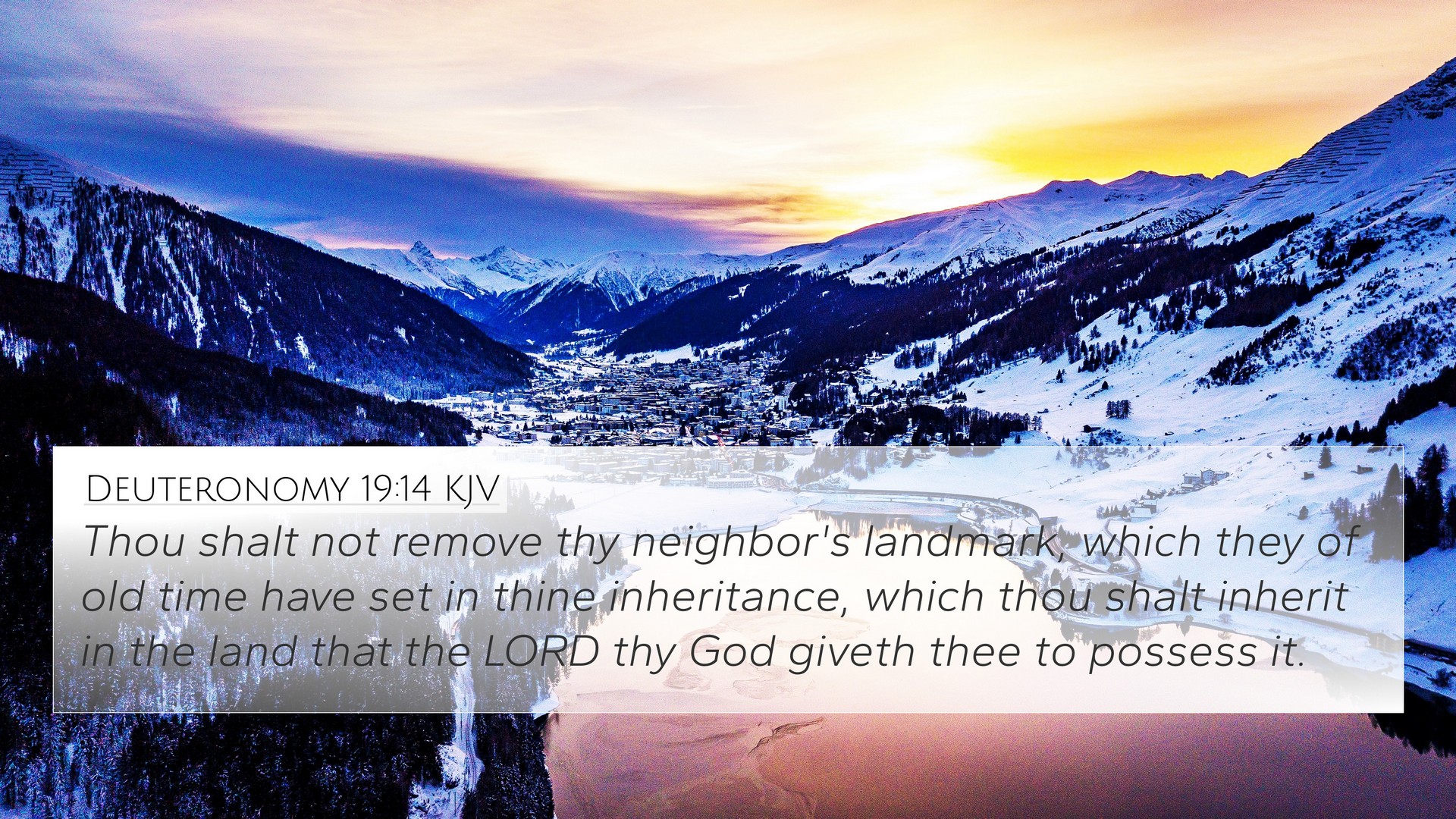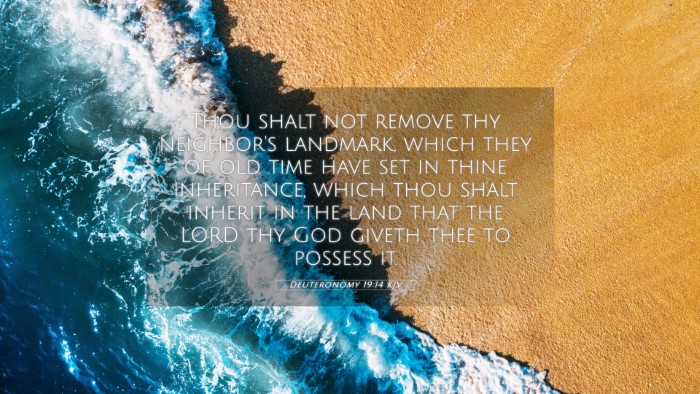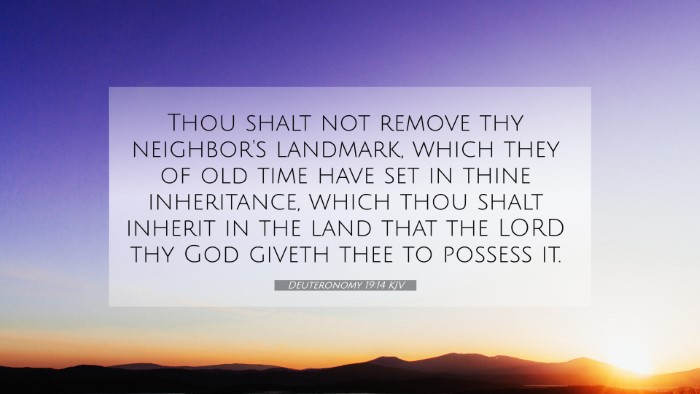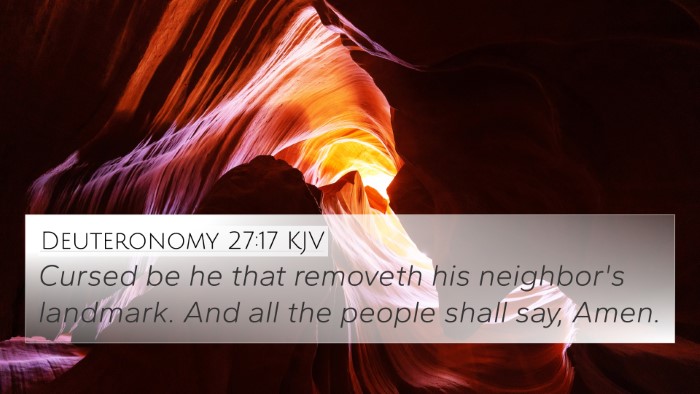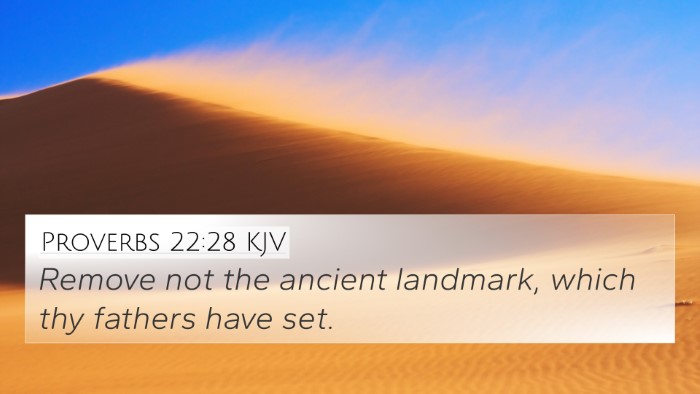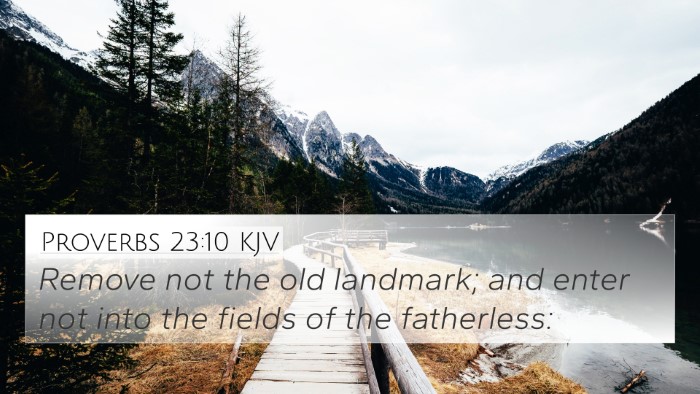Understanding Deuteronomy 19:14
Deuteronomy 19:14 states, "Thou shalt not remove thy neighbour's landmark, which they of old time have set in thine inheritance, which thou shalt inherit in the land that the LORD thy God giveth thee to possess it."
Overview of the Verse
This verse addresses the importance of maintaining property rights and respecting the boundaries established by previous generations. It serves as a reminder of the ethical and spiritual implications of property ownership within the covenant community of Israel.
Commentary Insights
-
Matthew Henry's Commentary: Henry emphasizes the sanctity of property and the moral duty to allow others their rightful inheritance. He highlights how altering boundaries represents not just a legal infraction, but a spiritual one that undermines community trust and faithfulness to God's commands.
-
Albert Barnes' Notes: Barnes notes that this command is rooted in the recognition of God's provision for His people. By respecting landmarks, individuals acknowledge divine order in distributions of land, recognizing that the boundaries are part of God's blessing.
-
Adam Clarke's Commentary: Clarke expands on the practical implications of respecting property lines. He notes that this command serves to prevent disputes and ensures societal harmony, reflecting God's desire for peaceful coexistence among His people.
Cross-References to Deuteronomy 19:14
Deuteronomy 19:14 can be cross-referenced with several other Biblical verses, establishing thematic connections regarding property rights, honesty, and justice. Here are some key passages:
- Proverbs 22:28 - "Remove not the ancient landmark, which thy fathers have set."
- Job 24:2 - "Some remove the landmarks; they violently take away flocks, and feed thereof."
- Micah 2:2 - "And they covet fields, and take them by violence, and houses, and take them away: so they oppress a man and his house, even a man and his heritage."
- Deuteronomy 27:17 - "Cursed be he that removeth his neighbour's landmark. And all the people shall say, Amen."
- Exodus 22:5 - "If a man shall cause a field or vineyard to be eaten, and shall put in his beast, and shall feed in another man's field; of the best of his own field, and of the best of his own vineyard, shall he make restitution."
- Hosea 5:10 - "The princes of Judah were like them that remove the bound: therefore I will pour out my wrath upon them like water."
- 1 Kings 21:16 - "And it came to pass, when Ahab heard that Naboth was dead, that Ahab rose up to go down to the vineyard of Naboth the Jezreelite, to take possession of it."
Thematic Connections
Thematic Bible verse connections reveal how Deuteronomy 19:14 interacts with broader scriptural narratives, reinforcing the significance of justice, property integrity, and communal responsibility. This verse illustrates God's concern for justice within the community and the importance of lawful conduct among His people.
This precept not only echoes throughout the Old Testament but resonates with New Testament themes as well, where Jesus teaches about fairness and integrity in various parables and teachings.
Application for Today
The principle of respecting boundaries and property extends into contemporary issues of fairness, ownership, and community relationships. The ethical implications of this verse challenge believers to reflect on their actions regarding others' possessions and rights.
In an age where personal interests often outweigh communal responsibilities, this passage serves as a critical reminder of the need for integrity and respect in all our dealings.
Conclusion
Deuteronomy 19:14 is a significant verse that underscores the importance of respecting property rights, fostering ethical behavior, and maintaining communal harmony. By examining cross-references and applying its principles, one can appreciate the depth of God's instructions for living in a just society.
For those studying the Bible, tools for Bible cross-referencing such as concordances can help one discover additional connections and themes across scriptures, enriching their understanding of Biblical teachings and enhancing their spiritual journey.
